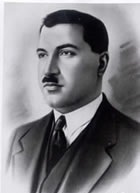Mustafa Necati
Mustafa Necati , also Mustafa Necati Uğural , (* 1894 in Izmir ; † January 1, 1929 ) was a Turkish politician. He was Minister of Reconstruction and Settlements, Minister of Justice and Minister of Education in the country's first governments.
Life

Mustafa Necati was born in Izmir in 1894 to Halit Bey and his wife Naciye. Mustafa Necati died before the resolution of the Turkish naming law from 1934. The descendants took the surname Uğural .
After attending elementary and secondary school, he studied law in Istanbul. In 1914 he returned to his hometown and worked as a lawyer and teacher. In the same year he founded the football club Altay İzmir with like-minded people . In 1915 he and his friend Hüseyin Vasıf Çınar founded a private school where Necati was the principal and teacher of literature. He also worked as a legal advisor for the railway company. After the First World War , which the Ottoman Empire lost, the Allies fired the railway workers. Mustafa Necati tried to defend workers' rights and founded a committee. He later expanded his activities to defend the rights of reserve officers who had returned from the front. After Izmir was occupied by the Greek army, Mustafa Necati fled to Istanbul and then in 1919 to Balıkesir , where he joined the resistance and fought in the Turkish Liberation War. In Balıkesir he published the newspaper Izmir'e Doğru ( direction Izmir ) with Çınar , which campaigned intensively against the Greek occupation power and for the Turkish liberation war. After Balıkesir was also occupied by the Greeks, the newspaper was discontinued.
As a politician during the Turkish Liberation War
After the Ottoman parliament was dissolved by the victorious Allied powers on March 16, 1920, the Turkish parliament was founded on April 23, 1920 and Mustafa Necati became a member of the Saruhan Province (today Manisa Province). Nevertheless, he spent most of the legislative period from 1920 to 1922 outside of Ankara. He became a member of the Independence Court in Sivas , later in Kastamonu, and was finally appointed President of the Independence Court in Amasya .
As a politician of the republic
Shortly after the Republic of Turkey was proclaimed on September 29, 1923, Mustafa Necati became a minister in the government of İsmet İnönü . In the first government he was Minister for Reconstruction and Settlements. He also had the task of implementing the population exchange between Greece and Turkey . The minister had to take care of the accommodation of around 155,000 arriving refugees.
In the second government, Mustafa Necati served as Minister of Justice. During his term of office, the Sharia and Sharia courts were abolished . In the fourth government he was then "Minister of Education" and kept this position in the fifth government until his death.
The Arabic alphabet was used in Turkey until 1928. However, the Turkish language uses eight vowels and umlauts that the Arabic script cannot represent. President Ataturk therefore decided to adopt and adapt the Latin alphabet. He insisted on implementing the reform immediately. In addition to the implementation of a new curriculum and the training of teachers, courses were offered for adults in the “elementary schools” ( Millet Mektebi in Turkish ). Mustafa Necati, minister of education, was responsible for the creation, making him one of the pioneers of the Turkish alphabet.
death
Mustafa Necati died on January 1, 1929 of complications from appendicitis and on the same day the primary schools opened. He was buried the next day in the Cebeci Asri cemetery in Ankara.
Controversy over Mustafa Necati's house
In 2006, Mustafa Necati's home was sold to a restaurant chain, which sparked protests. After an intense debate, the Grand National Assembly of Turkey decided in 2008 to turn the house into a cultural center.
Honors
There are Necatibey streets named after Mustafa Necati in several Turkish cities, including Kadıköy (Istanbul) and the Çayyolu district in Ankara. The Faculty of Education at Balıkesir Üniversitesi is also named after him.
literature
- M. Rauf Inan: Mustafa Necati: Kişiliği, Ulusal Eğitime Bakışı, Konuşma ve Anıları . Türkiye İş Bankası Kültür Yayınları, Ankara 1980
Web links
Remarks
- ↑ On the importance of Mustafa Necati for the Turkish education system, see Fuat Özer: Mustafa Necati Bey (1894-1 Ocak 1929) , Sosyal Bilimler Dergisi, University of Balıkesir, pp. 165–188
Individual evidence
- ^ History , Altay Izmir website, accessed April 23, 2018
- ↑ a b c d e f Fuat Özer: Mustafa Necati Bey (1894 - 1 Ocak 1929) , Sosyal Bilimler Dergisi, Balıkesir University
- ^ 1. Government of the Republic of Turkey , Grand National Assembly of Turkey , accessed on April 24, 2018
- ↑ Mustafa Necati , TC Başbakanlık Atatürk Kültür, Dil ve Tarih Yüksek Kurumu, Ataturk Araştırma Merkezi Başkanlığı, accessed on April 24, 2018 (Turkish)
- ↑ 2nd Government of the Republic of Turkey , Grand National Assembly of Turkey, accessed April 24, 2018
- ^ 4th Government of the Republic of Turkey , Grand National Assembly of Turkey, accessed April 24, 2018
- ↑ Mustafa Necati Evi Parliamentarian Birliği Binası Oldu , Haberler / Anka Haber Ajansı, April 22, 2008
- ↑ Mustafa Necati Kültür Evi , Grand National Assembly of Turkey, accessed on April 24, 2018
| personal data | |
|---|---|
| SURNAME | Mustafa Necati |
| ALTERNATIVE NAMES | Uğural, Mustafa Necati |
| BRIEF DESCRIPTION | Turkish politician |
| DATE OF BIRTH | 1894 |
| PLACE OF BIRTH | Izmir |
| DATE OF DEATH | January 1, 1929 |

